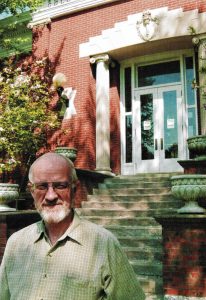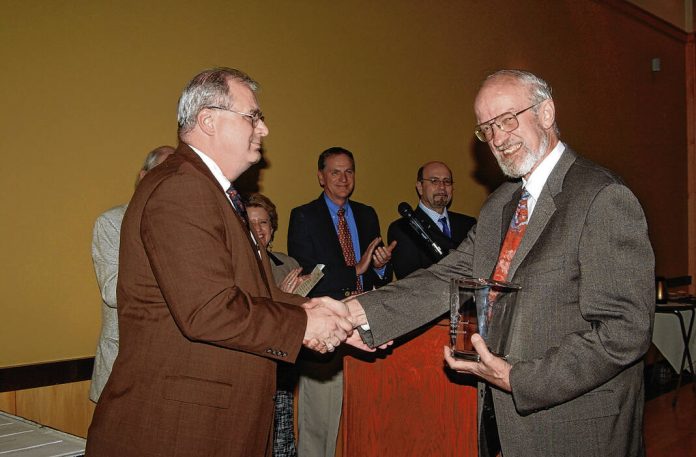At the end of his life, everyone had a different story to tell about him, and his life’s mission was to make sure they told stories well.
Professor Emeritus and former Franklin College Pulliam School of Journalism Director Bill Bridges died June 22 at the age of 88. He was a father, a husband, a professor and a mentor.
Bridges, who attended Franklin College in the 1950s, served in the U.S. Army in Germany, working on the Third Infantry Division’s weekly newspaper. After his time in the military, he stayed in Germany, working as a reporter for United Press International, at one time covering the Francis Gary Power spy trial.
After Germany, he traveled back to Indiana, where he met his wife, a public librarian he interviewed while he was working as a reporter for the Vincennes Sun-Commercial. Six months after their first date, Bill and Karen Bridges were engaged, and they stayed married for 60 years until Bill Bridges passed away.
Bridges returned to Franklin College in 1979, coming home to his alma mater as a full-time faculty member and chairman of the journalism department. He retired in 2003, leaving behind a career that transformed the Franklin College journalism program, with students winning awards over the years from state and national newspaper award committees.
‘He was just genuine’
To his students and colleagues, the professor emeritus made the Franklin College journalism program what it is today.
John Krull now serves as the Pulliam School of Journalism’s director, a role Bridges held before him. Krull was also his student years prior. Bridges began working at Franklin College during Krull’s junior year, serving as the professor for his news writing class. Even though Krull only had Bridges as an instructor for the second half of college, he had an immediate and profound impact on him, Krull said.
“Bill helped make the transition from theory to practice and really prepared people to go out and do the work. The assignments became much more grounded in real experience. We’d cover events on campus or in town and have to do them under deadline pressure,” Krull said. “Aside from lessons, I think the biggest impact was he encouraged me to apply for the Pulliam Fellowship.”
The fellowship transformed his career, as Krull interned for the Indianapolis News and the Indianapolis Star, turning the internship into a career at both papers that lasted nearly two decades.
“Probably the best memory I have is when (Bridges) called me to tell me I got the Pulliam Fellowship,” Krull said. “I said I didn’t want to apply because I was convinced I had no chance, but yet I did it. That was an important lesson Bill drove home. Part of being a teacher is seeing what your students can do even though they don’t believe they can do it and working with them until their appreciation of their gifts matches your own.”
Krull later left the journalism field and worked as the executive director of the Indiana Civil Liberties Union. In 2003, he announced his decision to leave that role, and he then got a call from Bridges, who wanted him to come back to his alma mater to replace him at the PSJ.
“The thing I appreciated most about Bill was he was just genuine. There was no pretense whatsoever to the man and I think that’s why students responded to him in the fashion they did,” Krull said. “I didn’t make any attempt to emulate him because there’s only one Bill. I think the thing we both had in common with the way we approached the job is that we were both very, very student-focused. It’s not what I want to do, but what do they need from us to achieve their potential.”
Curt Cavin, who graduated from Franklin College in 1987, also worked at the Indianapolis Star after college covering sports. He now is a senior writer with the Indianapolis Motor Speedway. Cavin’s success wasn’t an exception, he said. Bridges had a role in placing students in journalism jobs all over the world.
“It’s not just the number of interns and graduates he helped place, but how far-reaching his connections were across the profession,” Cavin said. “The connections a professor has is crucial at a small college, his ability to reach out and the places he worked and traveled to himself. He had journalists all over the world he touched and helped get better.”
‘Universally beloved’

Along with helping students make connections and have success as professional journalists, Bridges was also a character who left an imprint on the memories of his students. One of those students is Colleen Steffen, a 1994 Franklin College graduate who now is the executive editor of TheStatehouseFile.com, a professional news service run by Franklin College journalism students.
“He was eccentric and lovable. When I went to the funeral, it turned into a giant family reunion. He looked 60 when he was 30 and never aged another day. He had a distinctive way of talking, when he said his ‘s,’ it would whistle, and it was easy to do impressions of him,” Steffen said. “He was universally beloved by students. He was so kind and patient, but also strict. He really believed in the fundamentals, that this is a thing you do, so you have to go out and do it.”
When the Old Main building burned down in 1985, it was rebuilt with “Franklin College” etched in stone. There was one problem, though. The original etching had a period after “College.” The new one didn’t have that, and Bridges noticed, Steffen said.
“He noticed they didn’t put the period on, so they took it down. They had to re-carve that whole section,” she said. “Every time I go by Old Main, I see the period. It’s that terrifying attention to detail and the Franklin College legacy, five generations of his family have gone to Franklin. He cared so much about the place and I can’t imagine anyone but Bridges could get them to (re-carve it). He was so charming.”
Ahead of his time
While recently retired journalism professor Joel Cramer did not attend Franklin College as a student, he applied for a job to direct the college’s radio station in 1985. Bridges was part of a search committee that made the decision to hire him.
“He’s an old school newspaper man that had that air about him and he was very genuine, very open and forthright about the challenges the college was facing,” Cramer said. “In the spring, they had three fires on campus, two major, and he talked quite a bit about challenges the college would be facing as they tried to rebuild from the fires. I was struck by how genuine and open he was, but he also had a great sense of humor and a great laugh.”
Cramer was inspired by how, even as a veteran professor, Bridges evolved with the times, he said.
“He kept learning new skillsets,” Cramer said. “I still remember he was a very early adopter for having desktop computers for all students in the classroom. He was way ahead of the rest of the college, There was a program called XyWrite we adopted and he learned how to write macros and could do two to three tasks with just a keystroke. You don’t expect faculty who are further along to be that adaptive, but he was always doing new things and challenging himself with new techniques until the time he retired.”
Even after he retired in 2003, Bridges continued to be involved with Franklin College. He served as a mentor for students who needed an extra boost, and he kept up with stories students were publishing. He also regularly attended student journalism awards dinners, including one this year just weeks before he passed away.
Even though 2021 graduate Claire Castillo arrived at Franklin College long after Bridges retired, he still gave her valuable guidance as she tried to get back on track in her public relations classes.
“Bill genuinely changed my life. He made it so I got through PR, but I also gained a friend,” Castillo said. “Bill was just so genuine and so kind, and that was something I needed during my time in Franklin. I needed someone to be patient and kind. He had one of the best senses of humor I’d ever seen in someone who was a little bit older. Whenever I had to do marketing stuff, he said ‘a lede is 13 words, it cannot be over or under.’ That always made me laugh.”
Franklin College President Kerry Prather knew Bridges for the last four decades of his life and saw him most recently at the college’s spring commencement ceremony.
“He represents that generation of journalism that people miss and long for because it was less contentious, less biased and more objective. It was a more measured approach to news gathering,” Prather said. “I think what people appreciated about Bill was that he brought such a great sense of fairness and integrity to his work as an educator and a journalist.”
‘He wanted to be your friend’

Along with the decades of service to Franklin College, Bridges was a husband for 60 years and had four children, all of whom attended his alma mater. One of those children is Colin Bridges, 47, who pursued a career in 3D art and animation after majoring in theatre. Even though he didn’t go into journalism, his father supported him every step of the way, Colin Bridges said.
“It was wonderful being on campus at the same time as him because I could hang out with him in the middle of a college day. I could spend time with him and ask for advice and stop by his office,” he said. “Everywhere he went, he tried to connect with people: the cashier in the grocery store, the waitress, if he met you, he wanted to be your friend and get to know you. It didn’t matter if you were just going to see him for a few minutes, he made friends with every person he met.”
Even when he disagreed with people, he was kind, Colin Bridges said.
“He was the kindest person I ever met in my life. He was very encouraging and supporting,” he said. “My dad was my best friend, and with me and my three older brothers, he let us be ourselves, which was a great gift.”
Karen Bridges met her future husband shortly after she took a job as a librarian in Vincennes when he interviewed her for an article in the newspaper.
“About seven months later he asked me for a date, and six months later we were engaged,” Karen Bridges said. “We both liked to read and travel. We both liked to talk to people and we liked to talk to each other, too. We had four boys together. Bill was very proud of his boys, they all have a lot of writing ability. You can’t grow up in a family where words are your way of life without learning to write and tell stories.”
Karen Bridges traveled the world with her husband, visiting Japan, Taiwan, Australia and several countries in Europe. On all their trips together, Bill Bridges was able to make friends, and his ability to connect with people shone through as the people he’d met throughout his life paid their respects at his funeral, Karen Bridges said.
“Bill was famous for laughing and I have never heard that much laughter at a funeral in my life,” she said. “All the kids loved him, his fellow faculty members really liked him and admired him. I have gotten tributes and notes from faculty members and all of them were praising Bill’s work and the way he did it.”





